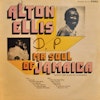Along with Ellis’s Sunday Coming for Coxsone Records, Mr. Soul of Jamaica established the rocksteady pioneer as one of the Caribbean island’s premier soul artists. Though the album features a few original compositions, it’s Ellis’s tackling of American R&B tunes that proved timeless. Included was “You Make Me Happy,” a cover of Brenda Holloway’s “You’ve Made Me So Very Happy” that became classic enough to warrant a mid-’70s re-edit with U-Roy protégé Ranking Trevor’s rub-a-dubs. Likewise, Ellis cut one of the definitive Jamaican versions of Johnnie Taylor’s 1966 hit for Stax Records, “Ain’t That Loving You (For More Reasons Than One).”
However, few of Ellis’s R&B recordings top his version of Jr. Walker’s “What Does It Take (To Win Your Love),” a song whose own history was serendipitous before ever landing at Duke Reid’s Bond Street studio. The song was originally cowritten and produced by Harvey Fuqua for the Motown subsidiary Soul. Walker thought it would make a strong single, but, as lore has it, Motown didn’t see the light until radio DJs began playing the song off of the LP. Once the label gave it a proper single release, it ended up becoming Walker’s biggest hit with the All-Stars.
I wouldn’t say that Ellis’s version “improves” on Walker’s original, but there is one major change that happened en route from Detroit to Kingston: Ellis’s version dropped the sax. Given that the Supersonics’ Tommy McCook was, like Walker, a saxophonist, I imagine it must have been a strange decision to have the Supersonics backing Ellis on “What Does It Take” sans horns. It was a brilliant, if ballsy, move, since later covers of the song by American artists often veered dangerously into “cheesy sax” territory (Kenny G covered the tune, natch). However, by replacing the sax melody with a guitar (likely played by Lynn Taitt), Ellis’s version stripped the song down without sacrificing its key hooks. That left Ellis to cruise in and crush his vocals, while the Flames backed him up beautifully.
Notably, Ellis apparently found the song so nice, he recorded it twice. The second cut appeared on Sunday Coming, and buried the sax melody even deeper—and still, no horns—within a longer and more mellow arrangement.


